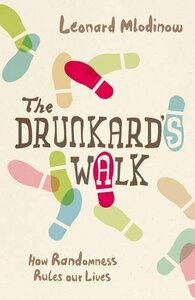You need to sign in or sign up before continuing.
Take a photo of a barcode or cover
informative
medium-paced
I loved this book. Very eye opening about how much chance is involved in success or failure. One repeated concept that I liked was the importance of determination in being successful. Great read.
I found the last two chapters very moving and inspiring. The book was enjoyable to read even though at some points it felt a little repetitive.
challenging
hopeful
informative
slow-paced
The last chapter was my favourite. Slow read, but worth it.
Even though at some point I had learned the math in the book, this was an enlightening look at it in the context of real life. I especially liked the closing sections of the book.
I was familiar with all the concepts, but the book helped me to crystallize and gain a more profound understanding on how the human brain due to it's evolution tries to perceive patterns even if they are not there.
3.5/5 - Highly enjoyable. Mlodinow keeps a good pace and presents information at just the right level to keep me reading even though I've previously read books on this topic. Definitely recommended for those unfamiliar with randomness, but I don't think I learned anything truly new from this book.
adventurous
funny
informative
inspiring
reflective
fast-paced
Para além de como o acaso influência em nossas vidas, nos mostra como olhar para os acontecimentos e paras as pessoas de diferentes maneiras. Irônico, informativo, muda a perspectiva de vida de quem lê. E, apesar da quantidade enorme de exemplos matemáticos, ilustra com muita clareza os conceitos para quem é leigo.
This book is an excellent overview of probabilities and statistics for laymen, especially the common errors people make. I think it's great information for everyone to have, and this is a good presentation of it.
Great book for artists!
Artists are often faced with inexplicable rejections from shows or publications. Quality work is ignored and denied. When an artist then arrives at the exhibition, the selected work is not of high quality and some random lump wins "best of show". I've always believed that awards and selections for inclusion in shows are frequently random or determined by factors other than quality of the work. This book suggests that I am correct in this belief.
Okay, so I'm being flip, but why was JK Rowling's Harry Potter manuscript repeatedly rejected by publishers? Obviously not because of quality or marketability. Why, when Stephen King, after becoming famous, published work under a pseudonym, did these works not do so well? Shouldn't the quality of work be the same? Random or unrelated factors influence the events that lead one artist or software engineer to be famous and the others unknown.
I don't feel like I'm doing the book justice, but it is very interesting and accessible. I appreciated the mix of scientific information, descriptions of case studies and experiments and anecdotes from the lives of the, well, rich and famous. Much of the information was new to me, though I read scientific non-fiction, books about psychology and all the "Blink" and "The Man Who Mistook His Wife For A Hat" and "Myth of the Garage" types of books I can get my hands on.
I'd recommend this book to artists (as I said) or other creative types. I'd recommend it to aspiring or struggling scientists and business owners and authors and other folks whose fates are influenced by the whims of chance.
I'd also recommend it to those people who never believed the Ouija board marker moved because of spirits, but also wanted to believe her friends weren't pushing the thing and lying about it.
Artists are often faced with inexplicable rejections from shows or publications. Quality work is ignored and denied. When an artist then arrives at the exhibition, the selected work is not of high quality and some random lump wins "best of show". I've always believed that awards and selections for inclusion in shows are frequently random or determined by factors other than quality of the work. This book suggests that I am correct in this belief.
Okay, so I'm being flip, but why was JK Rowling's Harry Potter manuscript repeatedly rejected by publishers? Obviously not because of quality or marketability. Why, when Stephen King, after becoming famous, published work under a pseudonym, did these works not do so well? Shouldn't the quality of work be the same? Random or unrelated factors influence the events that lead one artist or software engineer to be famous and the others unknown.
I don't feel like I'm doing the book justice, but it is very interesting and accessible. I appreciated the mix of scientific information, descriptions of case studies and experiments and anecdotes from the lives of the, well, rich and famous. Much of the information was new to me, though I read scientific non-fiction, books about psychology and all the "Blink" and "The Man Who Mistook His Wife For A Hat" and "Myth of the Garage" types of books I can get my hands on.
I'd recommend this book to artists (as I said) or other creative types. I'd recommend it to aspiring or struggling scientists and business owners and authors and other folks whose fates are influenced by the whims of chance.
I'd also recommend it to those people who never believed the Ouija board marker moved because of spirits, but also wanted to believe her friends weren't pushing the thing and lying about it.



